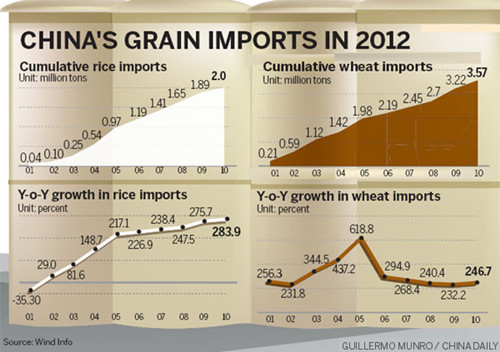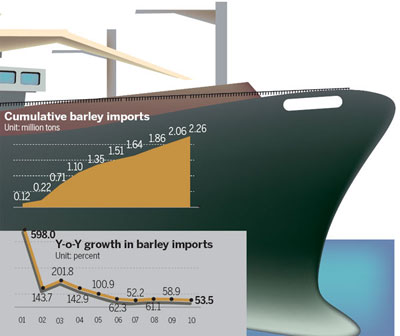

China, the world's largest grain consumer, saw its grain imports jump twofold during the January-to-November period compared with a year earlier.
This has triggered widespread concern about the country's long-asserted goal of maintaining its food security by domestically producing 95 percent of the rice, corn and wheat it consumes.
But analysts said there is no shortage of the staple crops in China, and so much was imported mostly because of big price differences in the domestic and relatively cheaper international markets.
Analysts also called for the government to let the minimum purchase prices of domestic crops fall, bringing them more in line with international prices.
During the first 11 months of this year, China's grain imports were a whopping 13.4 million metric tons, compared with 4.5 million tons in the same period last year, the latest industry data showed.
Given the country's usual huge imports of soybeans and barley, analysts said the increased imports of these two crops are "within expectations".
Yet some market observers are still worried about the strong increases of imports seen in rice and wheat.
Rice imports in the first 10 months of this year hit a historic high of 1.98 million metric tons, compared with 505,000 tons in the same period last year, according to the General Administration of Customs.
The US Department of Agriculture estimated China's rice imports this year will surge by four and a half times from a year earlier to 26 million tons. This amount would make China the world's second-largest importer of the crop, behind only Nigeria.
China's rice imports hovered around 450,000 tons per year over the past five years, of which high-end fragrant varieties accounted for the largest proportion. But this year's imports, in contrast, were mainly composed of cheaper cracked rice from Vietnam and Pakistan.
Analysts said the discrepancy in imports was created by the government's minimum purchase price, which shored up domestic grain prices while they declined in the global market because of weak demand caused by the sluggish economic recovery.
"The government should allow the purchase price some flexibility to fluctuate within the international market," said Ma Wenfeng, a senior analyst at Beijing Orient Agribusiness Consultant Ltd, one of the industry's largest specialist consultancies.
Ma also said cheap imports are likely to push down the price of domestic rice while piling up the country's stockpiles with domestically grown corps, which is likely to lead to a waste of the grain in processing and storage.
"The purchase price fell to 140 yuan ($22) from 150 yuan per 50 kilograms" a few months ago, said Liu Yinmei, a farmer in Liyang city of Jiangsu province, cited by Xinhua News Agency.
"I will not sell at such a price. I shall wait for it to go up a bit," she added.
Meanwhile, as large companies scrambled for imported rice, smaller processing mills were at a competitive disadvantage from higher production costs and lower selling price, companies and analysts said.
Xu Weidong, manager of a processing company in Liyang, said: "Our business has been hurt by (rice imports) as the price of processed rice also declined."
China's grain output this year rose 3.2 percent from a year earlier to 589.57 million tons, marking the ninth consecutive year of growth, according to data from the National Bureau of Statistics.
China's corn output this year amounted to 208.1 million tons, up 8 percent from a year earlier. Rice increased by 1.6 percent to 204.3 million tons. Meanwhile, wheat gained 2.7 percent to 120.6 million tons. These numbers show that corn has replaced wheat as China's chief grain variety, the bureau said in an online statement.

Copyright ©1999-2011 Chinanews.com. All rights reserved.
Reproduction in whole or in part without permission is prohibited.